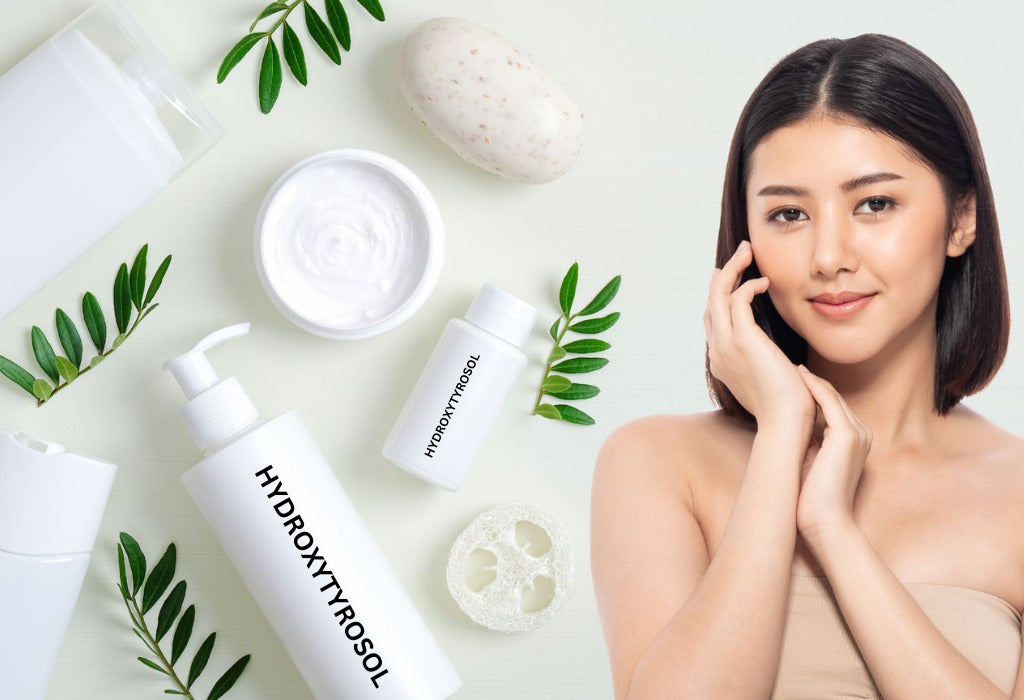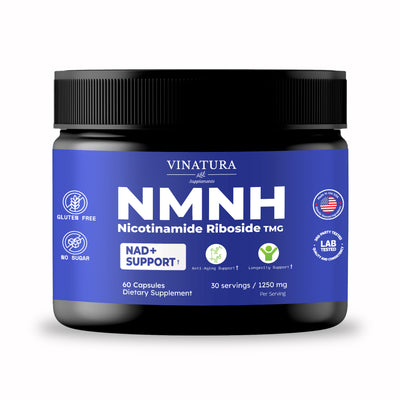
Hydroxytyrosol For Skin: Things To Know
Recently, more and more people have become aware of hydroxytyrosol in skincare products. However, there remains some skepticism about whether hydroxytyrosol is truly effective and safe for use on the skin. Additionally, people question its overall health benefits. If you have these doubts, don't hesitate to read the following article to find accurate answers!
Before exploring further, please read the disclaimer located at the end of this webpage.
Key Takeaways
- The benefits of hydroxytyrosol for skin include antioxidant properties, promoting a youthful appearance, balancing moisture, and soothing and repairing skin.
- You can use pure olive oil or buy products containing hydroxytyrosol to achieve these positive effects.
Hydroxytyrosol For Skin: How Does It Work?
Hydroxytyrosol is a widely used ingredient in daily skincare routines because of its impressive antioxidant and skin-soothing properties. Essentially, hydroxytyrosol supports the skin’s natural processes in a simple yet effective way.
It directly targets free radicals and neutralizes them, which helps maintain smooth, youthful-looking skin. Additionally, this compound promotes collagen production, enhancing skin elasticity and smoothness. So, what is hydroxytyrosol? Hydroxytyrosol (abbreviated as HXT) is one of the common phenolic compounds (*) found in olives and olive oil extracts (alongside oleuropein, caffeic acid, and tyrosol).
Known for its impressive antioxidant properties, hydroxytyrosol’s efficacy is comparable to gallic acid (an organic compound with antioxidant properties found in tea leaves) and may even outperform vitamin C or vitamin E. The concentration of this compound varies significantly based on the quality of the oil. For example, in extra virgin olive oil, you might find up to <2 mg/kg of HXT in every 14 mg/kg [1].
A distinguishing feature of HXT is its strong flavor and scent, which some users may find overpowering. Additionally, hydroxytyrosol often exists in the form of acetate (a salt derived from acetic acid combined with a base or metal) or as part of more complex compounds such as oleacein, oleuropein, and verbascoside, which directly influence the bitterness of olives as they ripen (the bitterness gradually decreases until fully ripe).
(*) Phenolic Compounds are renowned for their powerful antioxidant capabilities, including over 8,000 smaller compounds derived from the natural metabolic processes in plants.

Hydroxytyrosol Benefits For Skin
Powerful Antioxidant Properties
Hydroxytyrosol is renowned for its antioxidant capabilities, which can neutralize free radicals in the body. As a result, it helps maintain the body's natural defenses, promoting overall health.
Anti-Inflammatory Properties
In addition to its antioxidant effects, hydroxytyrosol also has anti-inflammatory properties. When applied to inflamed acne, hydroxytyrosol can help soothe the blemish, speed up its resolution, and promote healing. Furthermore, for skin experiencing allergies, redness, or irritation, hydroxytyrosol has shown promising results in quickly reducing natural swelling and discomfort.
This effect was documented by Harms and colleagues (2020) in the British Journal of Nutrition, which explored the relationship between plasma polyphenol levels and inflammation. The study found that hydroxytyrosol raised C-reactive protein (CRP) levels by 29%, indicating a healthy inflammatory response necessary for removing harmful substances from the body [4].
Anti-Aging Effects

Incorporating hydroxytyrosol into daily skincare routines, especially through moisturizing products, can counteract oxidative damage caused by pollutants, UV rays, or oxidative stress [3]. As a result, skin shows fewer signs of aging, such as fine lines and dark spots.
Skin Hydration
In a study by Jeon and Choi (2018), hydroxytyrosol was shown to reduce irritation in human dermal fibroblast (HDF) cells—cells responsible for collagen production and maintaining skin elasticity [2]. Combined with its collagen-stimulating abilities, hydroxytyrosol supports skin elasticity and hydration.
Protection Against Environmental Damage
Hydroxytyrosol’s powerful antioxidant properties were further validated in research by Joen and Choi (2018), demonstrating its ability to counteract harmful internal and environmental factors (such as free radicals and instability) that impact overall and skin health. Higher concentrations of hydroxytyrosol contribute to youthful, vibrant skin [2]. Moreover, hydroxytyrosol inhibits melanin production, promoting an even, bright complexion.
Can I Use Hydroxytyrosol For Acne?
Yes, hydroxytyrosol has antibacterial and skin-soothing properties, making it effective in calming skin issues like blemishes and irritation. It helps reduce discomfort quickly. Research also confirms that hydroxytyrosol has strong antibacterial effects against common skin bacteria, helping to limit skin issues, speed up healing, and promote clear skin [5].
However, since each person's skin is unique, consult a dermatologist before adding hydroxytyrosol to your daily skincare routine to ensure safety and reduce the risk of allergies.
Hydroxytyrosol For Skin Whitening: Should I Try?
As olives ripen, the polyphenol oleuropein is gradually converted into hydroxytyrosol, which becomes more potent. When applied to the skin, hydroxytyrosol supports an even, bright complexion by inhibiting melanin production and simultaneously increasing glutathione (GSH) levels—a compound produced by the liver that helps maintain an even skin tone.
This effect was demonstrated in a study involving 12 female volunteers aged 46 to 72, conducted over 8 to 12 weeks [6].
How To Use Hydroxytyrosol For Skin
Hydroxytyrosol in Foods
Hydroxytyrosol is commonly found in the daily diet of those following the Mediterranean diet, from easily accessible foods like ripe olives, olive oil extracts, olive powder, cherries, and even wine. It's important to choose food products from reputable brands with clear sourcing to ensure safety.
Hydroxytyrosol Supplements
In addition to obtaining hydroxytyrosol from foods, you can also supplement it through dietary supplements. The FDA recommends a maximum daily dose of 51.06 mg of hydroxytyrosol [7]. Look for products that offer a serving size that aligns with this recommendation and come in convenient forms (such as capsules or tablets) for ease of use.
Additionally, you should consider the purity level of hydroxytyrosol in the supplement you’re evaluating (higher purity typically indicates higher safety). Besides, don’t forget to know whether it includes any other ingredients (and if so, how these contribute to the absorption of hydroxytyrosol or offer additional health benefits), whether it contains any allergens, and if it has been third-party tested (a strong indicator of product safety).
Furthermore, you also should take time to review user experiences on effectiveness, tolerability, dosage, etc., to assess whether the supplement is a good fit for you.
Hydroxytyrosol Skincare Products
If you wish to use hydroxytyrosol for your skin, you can find it in products like moisturizers, acne gels, and more. However, before applying any hydroxytyrosol oil to the skin, it’s advisable to consult a dermatologist to find the best option for your skin type and condition, ensuring optimal results without causing any adverse reactions.
Is Hydroxytyrosol The Same As Olive Oil?
Hydroxytyrosol is a component naturally found in ripe olives, formed when the polyphenol oleuropein breaks down during the ripening process. Olive oil, on the other hand, is an extract from olives that contains not only hydroxytyrosol but also other compounds like free fatty acids, glycerol, and vitamins K and E.
Frequently Asked Questions
What Is The Best Source Of Hydroxytyrosol?
The best source of Hydroxytyrosol (HXT) comes from extra virgin olive oil extracted from common olive seeds, containing approximately 14 mg/kg of hydroxytyrosol [8, 9], followed by extracts from pitted and stuffed olives.
Where To Buy Hydroxytyrosol For Skin?
Currently, products containing hydroxytyrosol can be found on various platforms such as Amazon, supermarkets, and small retail distributors. However, regardless of where you purchase them, it's essential to thoroughly check the origin and ingredient list and ensure they come with proper food safety certifications to guarantee the product's authenticity and safety.
How To Use Hydroxytyrosol For Skin Tightening?
You can enhance skin firmness by applying serum every morning and evening after cleansing or using a balancing toner. Consider using HXT-infused creams at night for hydration and moisture retention, and apply HXT masks a few times a week to boost moisture.
What Is The Best Hydroxytyrosol For Skin?
TUsers can consider using 100% pure extra virgin olive oil, not mixed with any other oils (such as seed oils or vegetable oils), to apply on the skin as a daily moisturizer or as a hydrating mask. To ensure the purity and quality of olive oil, look for oils that meet the standards set by the International Olive Council (IOC).
Conclusion
From the information provided, we hope you have found the answer to whether hydroxytyrosol is beneficial for the skin and if it should be used. However, not all skin types are suitable for olive oil, particularly oily combination skin. Therefore, it is advisable to consult a doctor for proper usage guidance before starting.
References
- [1] Romero, C., Brenes, M., Khaled Yousfi, García, P., Aranzazu García, & Garrido, A. (2004). Effect of Cultivar and Processing Method on the Contents of Polyphenols in Table Olives. Journal of Agricultural and Food Chemistry, 52(3), 479–484. https://doi.org/10.1021/jf030525l.
- [2] Jeon, S., & Choi, M. (2018). Anti-inflammatory and anti-aging effects of hydroxytyrosol on human dermal fibroblasts (HDFs). Biomedical Dermatology, 2(1). https://doi.org/10.1186/s41702-018-0031-x.
- [3] Houda Zrelli, Matsuoka, M., Shiho Kitazaki, Araki, M., Kusunoki, M., Mokhtar Zarrouk, & Miyazaki, H. (2011). Hydroxytyrosol Induces Proliferation and Cytoprotection against Oxidative Injury in Vascular Endothelial Cells: Role of Nrf2 Activation and HO-1 Induction. Journal of Agricultural and Food Chemistry, 59(9), 4473–4482. https://doi.org/10.1021/jf104151d.
- [4] Harms, L. M., Augustin Scalbert, Zamora-Ros, R., Rinaldi, S., Mazda Jenab, Murphy, N., … Panico, S. (2019). Plasma polyphenols associated with lower high-sensitivity C-reactive protein concentrations: a cross-sectional study within the European Prospective Investigation into Cancer and Nutrition (EPIC) cohort. British Journal of Nutrition, 123(2), 198–208. https://doi.org/10.1017/s0007114519002538.
- [5] O. Eilami, Oliverio, M., & S. Hosseinian. (2017). Antimicrobial Effects of Hydroxytyrosol Extracted from Olive Leaves on Propionibacterium Acnes. Retrieved November 10, 2024, from https://www.semanticscholar.org/paper/Antimicrobial-Effects-of-Hydroxytyrosol-Extracted-Eilami-Oliverio/876d1fded5661bf90590d9c75691043f2618db9b.
- [6] Lueder, M. (2011). The olive: A natural supplier of active ingredients for skin lightening and age spot reduction. ResearchGate, 22(5), 271–274. Retrieved from https://www.researchgate.net/publication/290322864_The_olive_A_natural_supplier_of_active_ingredients_for_skin_lightening_and_age_spot_reduction.
- [7] FDA. (2015). Gras Notification. https://www.fda.gov/media/96937/download.
- [8] Cristina Vilaplana-Pérez, David Auñón, Libia A García-Flores, Angel Gil-Izquierdo. (2014). Hydroxytyrosol and Potential Uses in Cardiovascular Diseases, Cancer, and AIDS. Frontiers in Nutrition, 1. https://doi.org/10.3389/fnut.2014.00018.
- [9] Romero, C., Brenes, M., Yousfi, K., García, P., García, A., & Garrido, A. (2004). Effect of Cultivar and Processing Method on the Contents of Polyphenols in Table Olives. Journal of Agricultural and Food Chemistry, 52(3), 479–484. https://doi.org/10.1021/jf030525l.
Author

Product Disclaimer
The dietary supplement products mentioned on this website are formulated based on scientific research and adhere to FDA guidelines for dietary supplements. However, the content of the articles has not been evaluated by the Food and Drug Administration (FDA) and is not intended to promote or endorse any specific product. Any products sold on this website are not intended to diagnose, treat, cure, or prevent any disease.
Opinions and Endorsements
Any claims, statements, or opinions expressed in the articles are those of the author(s) and do not necessarily reflect the views or opinions of the manufacturers of the dietary supplement products. The products sold on this website are separate from the content of the articles and are not directly endorsed or associated with the information presented here.
Liability Disclaimer
The author(s) of the articles, website, and manufacturers of the dietary supplement products do not assume any liability for any potential consequences arising from the use of the information provided in the articles. It is recommended that individuals consult with a qualified healthcare professional before making any dietary or lifestyle changes, including the use of dietary supplements.
Product Usage
Please refer to the product labels and packaging for specific usage instructions and guidelines for the dietary supplement products sold on this website.
Customer Support
For any concerns or questions regarding the dietary supplement products, please contact our customer support team, who will be more than happy to assist you.





Leave a Comment
Be the first to comment.
What do you think?